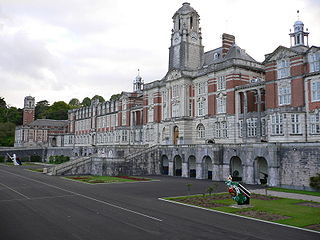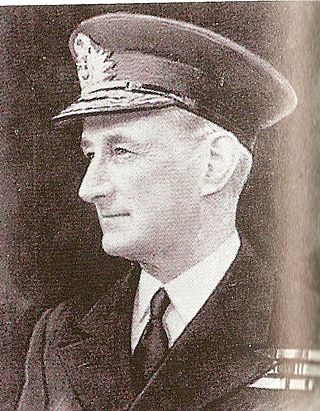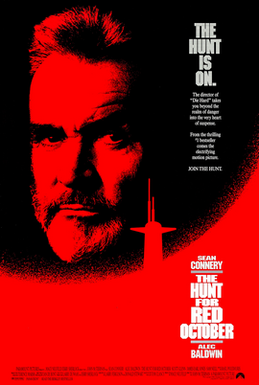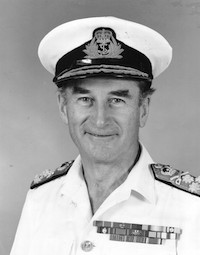Anthony Hunt (1932–2022) was a British engineer.
Anthony Hunt may also refer to:
- Anthony Hunt (Royal Navy officer, died 1795), Royal Navy captain
- Anthony Hunt (Royal Navy officer, died 1798), Royal Navy captain
Anthony Hunt (1932–2022) was a British engineer.
Anthony Hunt may also refer to:
The Hunt for Red October is the debut novel by American author Tom Clancy, first published on October 1, 1984, by the Naval Institute Press. It depicts Soviet submarine captain Marko Ramius as he seemingly goes rogue with his country's cutting-edge ballistic missile submarine Red October, and marks the first appearance of Clancy's most popular fictional character, Jack Ryan, an analyst working for the Central Intelligence Agency, as he must prove his theory that Ramius is intending to defect to the United States.

Britannia Royal Naval College (BRNC), commonly known as Dartmouth, is the naval academy of the United Kingdom and the initial officer training establishment of the Royal Navy. It is located on a hill overlooking the port of Dartmouth, Devon, England. Royal Naval officer training has taken place in Dartmouth since 1863. The buildings of the current campus were completed in 1905. Earlier students lived in two wooden hulks moored in the River Dart. Since 1998, BRNC has been the sole centre for Royal Naval officer training.

Vice-Admiral Lancelot Ernest Holland, was a Royal Navy officer who commanded the British force in the Battle of the Denmark Strait in May 1941 against the German battleship Bismarck. Holland was lost when he stayed at his post during the sinking of HMS Hood.
William Bolton may refer to:

The Hunt for Red October is a 1990 American submarine spy thriller film directed by John McTiernan, produced by Mace Neufeld, and starring Sean Connery, Alec Baldwin, Scott Glenn, James Earl Jones, and Sam Neill. The film is an adaptation of Tom Clancy's 1984 bestselling novel of the same name. It is the first installment of the film series with the protagonist Jack Ryan.

Captain is the name most often given in English-speaking navies to the rank corresponding to command of the largest ships. The rank is equal to the army rank of colonel and air force rank of group captain.

Admiral Sir Anthony Monckton Synnot, was a senior officer in the Royal Australian Navy, who served as Chief of the Defence Force Staff from 1979 to 1982.
John West may refer to:
Admiral Sir Anthony Storrs Morton was a senior Royal Navy officer and Vice-Chief of the Defence Staff.

Admiral Sir Nicholas John Streynsham Hunt was a senior Royal Navy officer. He was Commander-in-Chief Fleet from 1985 to 1987.
Anthony Molloy may refer to:
Rear-Admiral Derek James Anthony was a Royal Navy officer who became Flag Officer Scotland, Northern England and Northern Ireland.

Captain George Edward Hunt, was a highly decorated Royal Navy submarine commander during the Second World War. While commanding HMS Ultor, he became the British submarine commander with the greatest number of sinkings of enemy vessels to his name, though David Wanklyn achieved sinkings of greater tonnage. Of the 68 torpedoes Hunt fired, 47% hit their targets.
Captain Price is a character in the Call of Duty video game franchise.
Captain is a title, an appellative for the commanding officer of a military unit; the supreme leader of a navy ship, merchant ship, aeroplane, spacecraft, or other vessel; or the commander of a port, fire or police department, election precinct, etc. In militaries, the captain is typically at the level of an officer commanding a company or battalion of infantry, a ship, or a battery of artillery, or another distinct unit. The term also may be used as an informal or honorary title for persons in similar commanding roles.
Captain Sir Anthony Henry Thorold, 15th Baronet,, was an English Royal Navy officer, public servant, and councillor. He served as Captain of HMS Dryad from 1951 to 1952, and was Commodore in Charge, Hong Kong, from 1953 to 1955. After retirement, he turned to public service and politics, serving as High Sheriff of Lincolnshire for 1968 and as Leader of Lincolnshire County Council from 1973 to 1981.
Rear Admiral Galfry George Ormond Gatacre, was a senior officer in the Royal Australian Navy (RAN), who also played first-class cricket. His naval career began in 1921 and lasted until his retirement in 1964, during which time he spent a number of years on secondment to the Royal Navy. He saw action in both the Second World War and the Korean War, for which he was awarded the Distinguished Service Cross and the Distinguished Service Order. He also played first-class cricket in England for the Royal Navy Cricket Club. He was made a Commander of the Order of the British Empire in 1960 and, after retirement from the navy, he became a businessman.
The 1968 New Year Honours in New Zealand were appointments by Elizabeth II on the advice of the New Zealand government to various orders and honours to reward and highlight good works by New Zealanders. The awards celebrated the passing of 1967 and the beginning of 1968, and were announced on 1 January 1968.
As part of the British honours system, Special Honours are issued at the Monarch's pleasure at any given time. The Special Honours refer to the awards made within royal prerogative, operational honours and other honours awarded outside the New Years Honours and Birthday Honours.

Anthony Hunt was a post-captain in the Royal Navy who died young. He served as midshipman in the Carnatic in August 1789 and was shortly thereafter commissioned lieutenant. He was promoted post-captain in 1791, and appointed to the Amphitrite, which was wrecked under his command in late 1793. In 1796 he was promoted from the Concorde to the Virginie, and in her carried the Earl of Mornington on his passage to India. Arriving in Madras early in 1798, Hunt soon caught a violent fever and died.